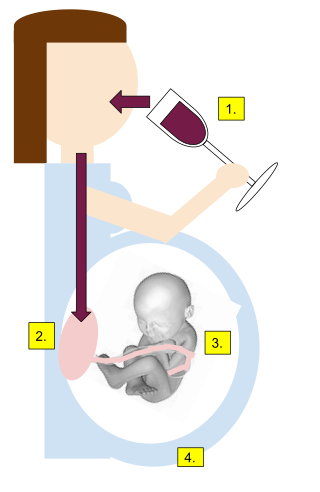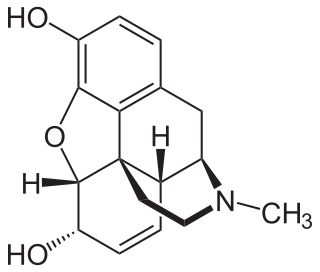Related Research Articles
Drug withdrawal, drug withdrawal syndrome, or substance withdrawal syndrome, is the group of symptoms that occur upon the abrupt discontinuation or decrease in the intake of pharmaceutical or recreational drugs.
Drug rehabilitation is the process of medical or psychotherapeutic treatment for dependency on psychoactive substances such as alcohol, prescription drugs, and street drugs such as cannabis, cocaine, heroin or amphetamines. The general intent is to enable the patient to confront substance dependence, if present, and stop substance misuse to avoid the psychological, legal, financial, social, and physical consequences that can be caused.
Aversion therapy is a form of psychological treatment in which the patient is exposed to a stimulus while simultaneously being subjected to some form of discomfort. This conditioning is intended to cause the patient to associate the stimulus with unpleasant sensations with the intention of quelling the targeted behavior.
Psychedelic therapy refers to the proposed use of psychedelic drugs, such as psilocybin, MDMA, LSD, and ayahuasca, to treat mental disorders. As of 2021, psychedelic drugs are controlled substances in most countries and psychedelic therapy is not legally available outside clinical trials, with some exceptions.

Alcohol dependence is a previous psychiatric diagnosis in which an individual is physically or psychologically dependent upon alcohol.

Carisoprodol, sold under the brand name Soma among others, is a medication used for musculoskeletal pain. Use is only approved for up to three weeks. Effects generally begin within half an hour and last for up to six hours. It is taken orally.

Opioid use disorder (OUD) is a substance use disorder characterized by cravings for opioids, continued use despite physical and/or psychological deterioration, increased tolerance with use, and withdrawal symptoms after discontinuing opioids. Opioid withdrawal symptoms include nausea, muscle aches, diarrhea, trouble sleeping, agitation, and a low mood. Addiction and dependence are important components of opioid use disorder.
Substance dependence, also known as drug dependence, is a biopsychological situation whereby an individual's functionality is dependent on the necessitated re-consumption of a psychoactive substance because of an adaptive state that has developed within the individual from psychoactive substance consumption that results in the experience of withdrawal and that necessitates the re-consumption of the drug. A drug addiction, a distinct concept from substance dependence, is defined as compulsive, out-of-control drug use, despite negative consequences. An addictive drug is a drug which is both rewarding and reinforcing. ΔFosB, a gene transcription factor, is now known to be a critical component and common factor in the development of virtually all forms of behavioral and drug addictions, but not dependence.
Sexual addiction is a state characterized by compulsive participation or engagement in sexual activity, particularly sexual intercourse, despite negative consequences. The concept is contentious; neither of the two major mainstream medical categorization systems recognise sex addiction as a real medical condition, instead categorizing such behavior under labels such as compulsive sexual behavior.
Motivational therapy is a combination of humanistic treatment and enhanced cognitive-behavioral strategies, designed to treat substance use disorders. It is similar to motivational interviewing and motivational enhancement therapy.
An addictive behavior is a behavior, or a stimulus related to a behavior, that is both rewarding and reinforcing, and is associated with the development of an addiction. There are two main forms of addiction: substance use disorders and behavioral addiction. The parallels and distinctions between behavioral addictions and other compulsive behavior disorders like bulimia nervosa and obsessive-compulsive disorder (OCD) are still being researched by behavioral scientists.

Alcohol detoxification is the abrupt cessation of alcohol intake in individuals that have alcohol use disorder. This process is often coupled with substitution of drugs that have effects similar to the effects of alcohol in order to lessen the symptoms of alcohol withdrawal. When withdrawal does occur, it results in symptoms of varying severity.
Drug addiction recovery groups are voluntary associations of people who share a common desire to overcome their drug addiction. Different groups use different methods, ranging from completely secular to explicitly spiritual. Some programs may advocate a reduction in the use of drugs rather than outright abstention. One survey of members found active involvement in any addiction recovery group correlates with higher chances of maintaining sobriety. Although there is not a difference in whether group or individual therapy is better for the patient, studies show that any therapy increases positive outcomes for patients with substance use disorder. The survey found group participation increased when the individual members' beliefs matched those of their primary support group. Analysis of the survey results found a significant positive correlation between the religiosity of members and their participation in twelve-step programs and to a lesser level in non-religious SMART Recovery groups, the correlation factor being three times smaller for SMART Recovery than for twelve-step addiction recovery groups. Religiosity was inversely related to participation in Secular Organizations for Sobriety.
SMART Recovery is an international community of peer support groups that help people recover from addictive and problematic behaviors, using a self-empowering and evidence-informed program. SMART stands for Self-Management and Recovery Training. The SMART approach is secular and research-based. SMART has a global reach, with a presence established in more than 30 countries. SMART Recovery is effective with a range of addictive and problematic behaviors

Substance use disorder (SUD) is the persistent use of drugs despite the substantial harm and adverse consequences to one's own self and others, as a result of their use. In perspective, the effects of the wrong use of substances that are capable of causing harm to the user or others, have been extensively described in different studies using a variety of terms such as substance use problems, problematic drugs or alcohol use, and substance use disorder. The National Institute of Mental Health (NIMH) states that "Substance use disorder (SUD) is a treatable mental disorder that affects a person's brain and behavior, leading to their inability to control their use of substances like legal or illegal drugs, alcohol, or medications. Symptoms can be moderate to severe, with addiction being the most severe form of SUD". Substance use disorders (SUD) are considered to be a serious mental illness that fluctuates with the age that symptoms first start appearing in an individual, the time during which it exists and the type of substance that is used. It is not uncommon for those who have SUD to also have other mental health disorders. Substance use disorders are characterized by an array of mental/emotional, physical, and behavioral problems such as chronic guilt; an inability to reduce or stop consuming the substance(s) despite repeated attempts; operating vehicles while intoxicated; and physiological withdrawal symptoms. Drug classes that are commonly involved in SUD include: alcohol (alcoholism); cannabis; opioids; stimulants such as nicotine, cocaine and amphetamines; benzodiazepines; barbiturates; and other substances.

Addiction is a neuropsychological disorder characterized by a persistent and intense urge to use a drug or engage in a behaviour that produces natural reward, despite substantial harm and other negative consequences. Repetitive drug use often alters brain function in ways that perpetuate craving, and weakens self-control. This phenomenon – drugs reshaping brain function – has led to an understanding of addiction as a brain disorder with a complex variety of psychosocial as well as neurobiological factors that are implicated in addiction's development. Classic signs of addiction include compulsive engagement in rewarding stimuli, preoccupation with substances or behavior, and continued use despite negative consequences. Habits and patterns associated with addiction are typically characterized by immediate gratification, coupled with delayed deleterious effects.
Motivational enhancement therapy (MET) is a time-limited, four-session adaptation used in Project MATCH, a US-government-funded study of treatment for alcohol problems, and the "Drinkers' Check-up", which provides normative-based feedback and explores client motivation to change in light of the feedback. It is a development of motivational interviewing and motivational therapy. It focuses on the treatment of alcohol and other substance use disorders. The goal of the therapy is not to guide the patient through the recovery process, but to invoke inwardly motivated change. The method has two elements: initial assessment battery session, and two to four individual therapeutic sessions with a therapist. During the first session, the specialist stimulates discussion on the patient's experiences with substance use disorder and elicits self-motivational statements by providing feedback to the initial assessment. The principles of MET are utilized to increase motivation and develop a plan for further change; coping strategies are also presented and talked over with the patient. Changes in the patients behavior are monitored and cessation strategies used are reviewed by the therapist in the subsequent sessions, where patients are encouraged to sustain abstinence and progress.

A psychoactive drug, psychopharmaceutical, psychoactive agent, or psychotropic drug is a chemical substance that changes the function of the nervous system and results in alterations of perception, mood, cognition, and behavior. These substances may be used medically, recreationally, for spiritual reasons, or for research. Some categories of psychoactive drugs may be prescribed by physicians and other healthcare practitioners because of their therapeutic value.
About 1 in 7 Americans suffer from active addiction to a particular substance. Addiction can cause physical, psychological, and emotional harm to those who are affected by it. The American Society of Addiction Medicine defines addiction as "a treatable, chronic medical disease involving complex interactions among brain circuits, genetics, the environment, and an individual's life experiences. People with addiction use substances or engage in behaviors that become compulsive and often continue despite harmful consequences." In the world of psychology and medicine, there are two models that are commonly used in understanding the psychology behind addiction itself. One model is referred to as the disease model of addiction. The disease model suggests that addiction is a diagnosable disease similar to cancer or diabetes. This model attributes addiction to a chemical imbalance in an individual's brain that could be caused by genetics or environmental factors. The second model is the choice model of addiction, which holds that addiction is a result of voluntary actions rather than some dysfunction of the brain. Through this model, addiction is viewed as a choice and is studied through components of the brain such as reward, stress, and memory. Substance addictions relate to drugs, alcohol, and smoking. Process addictions relate to non-substance-related behaviors such as gambling, spending money, sexual activity, gaming, spending time on the internet, and eating.

Aleksandr Romanovich Dovzhenko was a Soviet and Ukrainian physician, psychiatrist, psychotherapist and substance abuse counselor. He is most famous for developing the Dovzhenko's method ("Coding").
References
- 1 2 3 4 5 Finn, Peter (October 2, 2005). "Russia's 1-Step Program: Scaring Alcoholics Dry". The Washington Post . Retrieved June 9, 2011.
- 1 2 Mosher, Clayton (2007). Drugs and Drug Policy. Thousand Oaks: Sage. p. 269. ISBN 978-0-7619-3007-5 . Retrieved June 9, 2011.